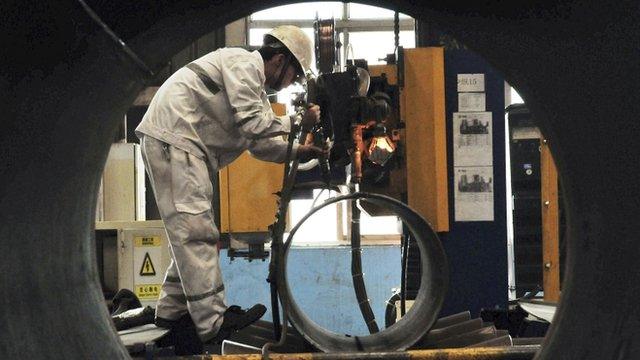Employers warn of widening skills shortage
- Published

UK employers say they need a better supply of skilled workers to compete in a global economy
An increasing number of UK employers are worried that they will not be able recruit enough high-skilled employees, according to an annual CBI survey.
The survey of 500 employers found 69% were concerned about not being able to find enough highly-skilled staff, compared with 55% last year.
The report showed that demand for low-skilled workers would continue to fall.
Tackling this skills gap has become a "top business priority", said CBI deputy director general Josh Hardie.
The survey says this could become even more difficult after the decision to leave the European Union.
"Not only will we have our existing UK skills shortages to address, but potentially reduced access to migrant skills will also impact businesses," says the CBI's report on the survey results.
Neil Carberry, the business group's director of employment and skills, said it was "absolutely critical" that businesses had clarity on the status of EU nationals currently working in the UK.

Automation has seen robots taking manufacturing jobs
The CBI's education and skills survey examines the recruitment needs of firms employing more than three million staff between them.
The results show a changing jobs market, with employers saying they need to recruit more skilled staff, while cutting the number of low-skilled jobs.
But there are concerns about whether there is an adequate pool of such well-qualified staff, with more than two-thirds of firms not confident there will be enough staff to meet demand.
There are also problems with basic skills, with the survey showing almost a third of businesses had concerns about the literacy and numeracy levels of their new recruits.
But employers were more likely to rate "attitude to work" as more important than formal qualifications.

Office life: Firms expect to increase high-skilled staff and cut low-skilled jobs
Rod Bristow, president of Pearson UK, and co-sponsor of the survey, said: "Employers don't just value what people know; they value what they can do. By far the most important 'skills factor' centres on attitudes and aptitudes such as ability to present well."
Improving careers advice was also seen as important and in a separate survey, the Baker Dearing Educational Trust, which supports University Technical Colleges, found that young people particularly benefited from direct contact with employers, such as work experience and talks from employers.
The CBI report reflects doubts about the government's proposed apprenticeship levy, which will take a levy from bigger employers to pay for targets for more apprenticeships.
The report warns that employers want "better quality training places" and do not want to pay extra for current training to be "rebadged".
Mr Hardie said the levy scheme "will need a genuine change of direction if it is to work" and he warned that employers still did not have enough practical information about the proposals.
"As it stands the levy system will work in Whitehall but it won't work in Walsall," he said.
But Petra Wilton, director of strategy at the Chartered Management Institute, said: "We need to stop knocking the apprenticeship levy and remember why it exists, we're failing to invest in the future and hurting our international competitiveness."
Mr Carberry said skills would be the key to the UK's competitiveness, regardless of what type of trading arrangements were concluded after the UK ends its EU membership.
"If you want a high skills, high pay UK, it's all based on skills."
A spokeswoman for the Department for Education said: "We are introducing the apprenticeship levy so that businesses have the talent they need to grow and thrive.
"We will continue to work closely with businesses of all sizes to design the levy around their needs and the need of their employees."